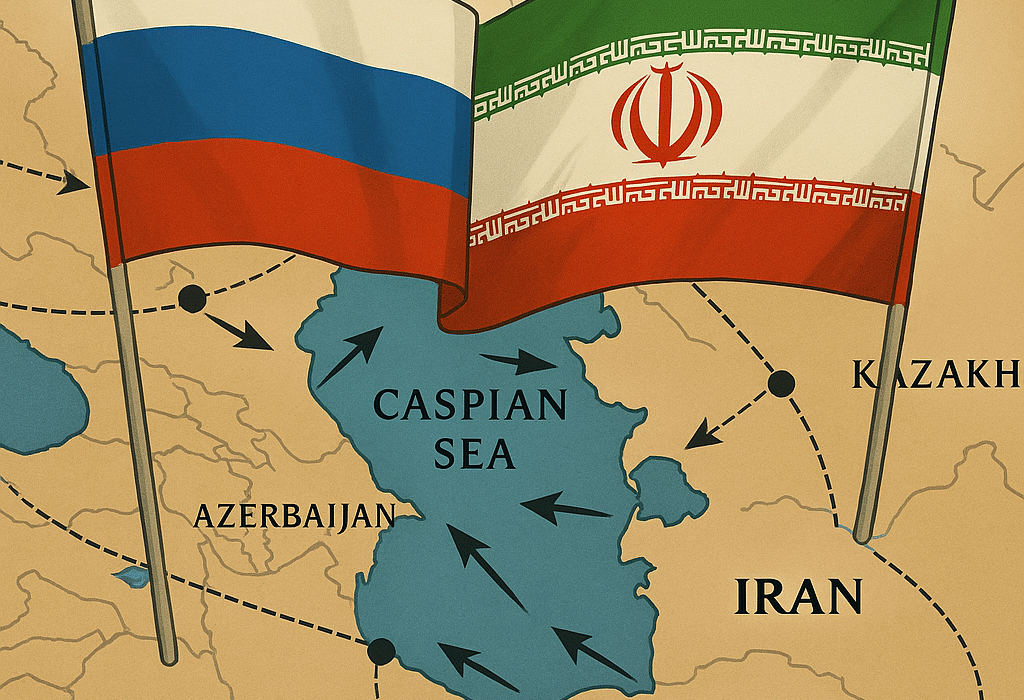by Turan Rzayev
Starting from July 21, Iran and Russia are set to conduct a joint maritime search and rescue drill (CASAREX 2025) in the Caspian Sea under the slogan “Together for a Safe and Secure Caspian Sea.” The exercise will involve the Iranian Army and IRGC Naval Forces, the Iranian Police Command, the Russian Navy, and observers from other Caspian littoral states. While the stated goal is to enhance maritime security and foster cooperation among regional naval forces, the broader implications of this drill go far beyond technical collaboration.
Let’s be clear: despite its name, CASAREX 2025 is not merely a standard rescue exercise. It takes place at a time when Russia-Azerbaijan relations are experiencing unprecedented strain, and mutual trust between Moscow and Baku has significantly eroded. In this context, the drill can be interpreted as a symbolic message from the Kremlin to Baku.
The mention of “observers from Caspian states” is diplomatically ambiguous. On one hand, it signals an “open-door” policy—an invitation for Azerbaijan to attend. On the other, it creates pressure by suggesting that countries not participating could be perceived as isolated. This dual messaging functions both as a form of soft coercion and an attempt to portray a unified regional front excluding Azerbaijan.
Russia and Iran’s deepening naval cooperation in the Caspian—especially with Azerbaijan left on the sidelines—could also be interpreted as an indirect political warning to Baku. The Iran angle is particularly noteworthy. During the 3rd Shusha Global Media Forum, President Ilham Aliyev stated in an interview with Iran’s Mehr news agency that relations between Tehran and Baku are in excellent shape and will continue to improve.
“We recently welcomed Iranian President Masoud Pezeshkian in the city of Khankendi, which was a positive development. The construction of the corridor over the Araz River is progressing well, and our portion is nearly complete. We are waiting for the Iranian company to finalize their segment. We have finished a significant portion of the Agbend-Kelaleh-Julfa corridor, and I expect it will be operational by the end of this year,” President Aliyev said.
Indeed, there has been a recent thaw in Baku-Tehran relations, with Pezeshkian playing an enthusiastic role. However, as I have often emphasized, power in Iran is not monolithic. Thus, interpreting Iranian foreign policy requires a nuanced understanding of its internal dynamics. Against this backdrop, Iran’s participation in CASAREX 2025 could be seen as part of Moscow’s broader strategy to respond to Baku.
Russia aims to demonstrate that the Caspian is firmly within its sphere of influence and that it has the ability to reshape the region’s security architecture. Iran, which is sensitive to both the Zangezur corridor and Azerbaijan’s ties with Israel, can easily fall under Russian sway. In this context, the exercise is not merely technical—it reflects coordinated dissatisfaction from two regional powers toward Azerbaijan.
Over the past months, rhetoric from Russian officials, media, and military circles concerning Azerbaijan has grown notably harsher. Baku’s increasing Western engagement and its principled stance on Ukraine have added to Moscow’s discontent. President Aliyev’s recent comment at the Shusha Forum—“My advice to the Ukrainian people: never accept occupation”—was perceived in Moscow as a direct challenge to Russian policy.
This remark was more than symbolic—it marked a shift in Azerbaijan’s traditionally cautious balancing act. Publicly supporting a country at war with Russia underscores Baku’s evolving foreign policy posture.
Undoubtedly, CASAREX 2025 is being closely monitored by Azerbaijan and its allies. While Baku typically responds to such developments with diplomatic restraint, it does not mean that risks go unnoticed or that counterstrategies are absent. On the contrary, Azerbaijan seeks to maintain Caspian stability but cannot allow the balance of power to be disrupted.
Russia is clearly attempting to create the perception that Azerbaijan stands alone. The level and form of participation by Kazakhstan and Turkmenistan may also be designed to reinforce this image. Moscow’s message is that a “unified Caspian front” exists—one in which Azerbaijan is an outsider.
In response, Baku may intensify strategic coordination with Ankara. For Turkey, Caspian stability is equally vital. The success of the Organization of Turkic States and the Middle Corridor initiatives hinge on stability in the region. As a NATO member and leading Turkic power, Turkey cannot ignore the implications of a Russia-Iran naval tandem.
Ankara’s response is unlikely to be overtly military but may involve enhanced bilateral defense cooperation with Baku. For instance, joint drills reminiscent of the “Indestructible Brotherhood – 2021” exercise held in September 2021 could be revived. Depending on the situation, even the participation of Turkish F-16s might be considered—a potent signal to both Tehran and Moscow.
Additionally, although Azerbaijan has long maintained the Caspian as a non-NATO, non-militarized zone, it may now feel compelled to signal that such restraint is conditional. By inviting or coordinating with other actors in various formats—such as the U.S., China, or NATO—Baku can challenge the emerging narrative of exclusion.
In essence, CASAREX 2025 marks the first tangible sign of Moscow’s growing frustration with Baku taking a geopolitical shape. But this alone is not enough to intimidate Azerbaijan. Baku has strengthened its position through agile diplomacy and robust alliances. In this light, President Aliyev’s message—“Never accept occupation”—was not just a piece of advice to Ukraine, but a broader signal to countries under Russian influence.

